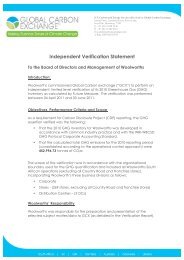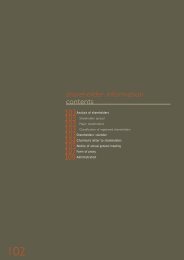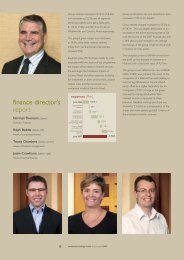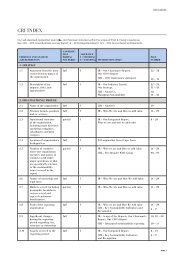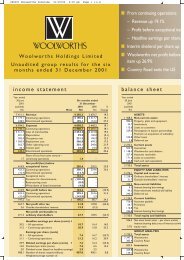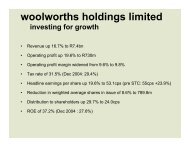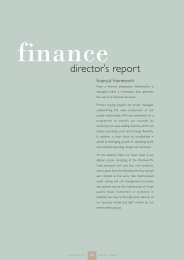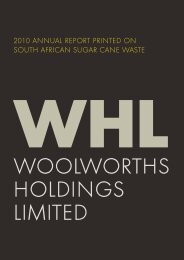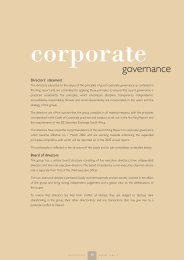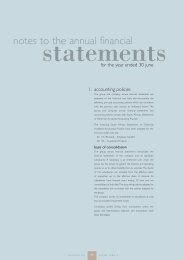WoolWorths holdings limited 2013 good BUsiness JoUrneY report
WoolWorths holdings limited 2013 good BUsiness JoUrneY report
WoolWorths holdings limited 2013 good BUsiness JoUrneY report
You also want an ePaper? Increase the reach of your titles
YUMPU automatically turns print PDFs into web optimized ePapers that Google loves.
Environment<br />
CASE STUDY: GREENPAK<br />
Greenpak farms are based in the Bothaville area in the<br />
Free State, close to the banks of the Vaal River. They have<br />
been one of the most impressive suppliers applying our<br />
Farming for the Future programme and have seen some<br />
substantial water savings in particular, while simultaneously<br />
increasing their amount of carrots delivered to Woolworths<br />
over the last 14 months (see graph illustration below).<br />
amount of carrots delivered to woolworths<br />
over the last 14 months<br />
80<br />
70<br />
60<br />
50<br />
40<br />
30<br />
20<br />
10<br />
0<br />
1 2 3 4 5 6 7 8 9 10 11 12 13 14<br />
Tons delivered<br />
to Woolworths<br />
Average use of<br />
water per day m 3<br />
Water management measures implemented include:<br />
• Electronic measurement of water used in pack house<br />
• Use of carrot shaker to loosen soil particles before washing<br />
• Improved cleaning procedures (low water flow foaming<br />
system instead of hoses)<br />
• Staff training to avoid spillages and to limit water loss<br />
during cleaning processes<br />
• Improved understanding of legal volume requirements<br />
for wastewater end-use<br />
Reasons for water reduction on Greenpak fields include:<br />
• Improved measurement of water use efficiency<br />
• More accurate interpretation of water measurements<br />
• Mitigation plan in place to accommodate extreme weather<br />
patterns<br />
• Only keeping the root zone of the carrots wet<br />
• Balancing fertiliser applications with water applications<br />
• Identifying of which type of soil suits the crops done on a<br />
more scientific basis<br />
• Better variety selection (winter vs. summer)<br />
• Managing planting density to fit in with Woolworths’<br />
specifications<br />
Greenpak implemented simple water treatment principles that<br />
have resulted in legal compliance. Step one has been selecting<br />
beneficial and sustainable end-use of wastewater (irrigation<br />
of pastures) and knowing their legal requirements. In the<br />
packhouse they are:<br />
• Using only environmentally friendly cleaning agents<br />
and disinfectants:<br />
– Phasing out chemicals containing sodium (Na)<br />
– Phasing out acids that have been increasing Chemical<br />
Oxygen Demand (COD)<br />
– Avoiding solids entering wastewater stream<br />
• Treating the wastewater by:<br />
– Screening out coarse solids<br />
– Settling out fine solids<br />
– Applying aeration and sufficient containment.<br />
The latest wastewater chemical data indicates:<br />
parameter<br />
Before<br />
treatment<br />
After<br />
treatment<br />
Legally<br />
required<br />
Chemical oxygen demand (COD): mg/kg 33 500 626 5 000<br />
pH 4.5 6.6 6 – 9<br />
Speaking for Greenpak, Toks Liebenberg said that Farming for the Future has taught them to measure and interpret the results<br />
in a scientific way. Farming for the Future has also taught them to approach their farming in a holistic manner by for example<br />
recognising that irrigation water does have nutrients, and must be taken into consideration in their fertiliser program.<br />
WHL 66 / <strong>2013</strong> GOOD BUSINESS JOURNEY



